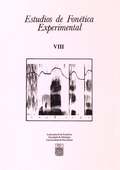Foco en el español de Canarias: dos experimentos
Abstract
An acoustic study of linguistic focus in two experiments of production through materials emitted by seven Canary Islands informants was explored. In one experiment different wh-question contexts triggered read emissions of neutral, broad-focus and narrow-focus sentences. In a second experiment, informants produced a read corpus of neutral, single-focus at first and last position in the utterance, and dual-focus sentences contextually designed. The experiments have been set up to analyze prominence in focused items encoded through F0, duration, and amplitude features. To that end, intonation contours, spectrograms and amplitude values were made for acoustic measurements. Results did not support the findings reported for other languages as French which indicated a higher degree of prominence in focused items. On the contrary, the statistical data shows no differences among focused and unfocused items, and among neutral and focused sentences. The findings suggested that in this dialect the prosodic encoding of focus appears to be ruled by the speakers in a contextually independent and unpredictable manner.
Downloads
Published
How to Cite
Issue
Section
License

This work is licensed under a Creative Commons Attribution-NonCommercial-NoDerivatives 4.0 International License.
All articles published online by Estudios de Fonética Experimental are licensed under Creative Commons Attribution-NonCommercial-NoDerivs 4.0 International (CC BY-NC-ND 4.0 DEED), unless otherwise noted. Estudios de Fonética Experimental is an open access journal. Estudios de Fonética Experimental is hosted by RCUB (Revistes Científiques de la Universitat de Barcelona), powered by Open Journal Systems (OJS) software. The copyright is not transferred to the journal: authors hold the copyright and publishing rights without restrictions. The author is free to use and distribute pre and post-prints versions of his/her article. However, preprint versions are regarded as a work-in-progress version used as internal communication with the authors, and we prefer to share postprint versions.




